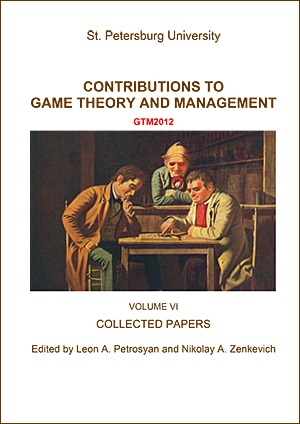Asymmetric Equilibria in Stahl Search Model
Abstract
The paper explores the classic consumer search model introduced by Stahl in (Stahl, 1989). Literature uses the unique symmetric Nash Equilibrium, but does little to discuss asymmetric Equilibria. This paper describes all possible asymmetric Nash Equilibria of the original model, under the common literature assumption of consumer reserve price. Those include strategies of three types: pure, continuous mixing and a mixture of the previous two types. The findings suggest that on some level, lower than the symmetric Equilibrium, price dispersion will still exist, together with some level of price stickiness, both observed in reality.
Keywords:
Sequential Consumer Search, Oligopoly, Asymmetric NE
Downloads
References
Astorne-Figari, C., A. Yankelevich (2010). Asymmetric Sequential Search. Available at SSRN: http://ssrn.com/abstract=1622809
Bakucs, L. Z., F. Imre (2009). Milk Retail Sales Patterns in a Traditional Economy. The Case of Hungary. Agricultural Economics Society, 83rd Annual Conference (09').
Baye, M., D. Kovenock, C. de Vries (1992). It takes two to Tango: Equilibrium in a model of sales. Games and Economic Behavior, 4, 493–510.
Barron, G., E. Yechiam (2009). The coexistence of overestimation and underweighting of rare events and the contingent recency effect. Judgment and Decision Making, 4(6), 447–460.
Baye, M., J. Rupert, J. Gatti, P. Kattuman, J. Morgan (2009). Clicks, Discontinuities and Firm Demand Online. Journal of Economics and Management Strategy, 18(4), 935–975.
Baye, M., J. Morgan (1999). A folk Theorem in one shot Bertrand Games. Economic Letters, 65, 59–65.
Burdett, K., K. Judd (1983). Equilibrium Price Dispersion. Econometrica, 51, 955–970.
Burdett, K., E. Smith (2009). Price Distribution and Competition. Federal Reserve of Atalanta, working papers series, working paper 2009-27.
Chen, Y., T. Zhang (2009). Equilibrium price dispersion with heterogeneous searchers. International Journal of industrial organisation, 29(6), 645–654.
Chioveanu, I., J. Zhou (2011). Price Competition with Consumer Confusion. NYU Working Paper. Available at SSRN: http://ssrn.com/abstract=1944447.
Davis, M. C., J. D. Hamilton (2003). Why are prices sticky? The dynamics of wholesale gasoline prices. Working Paper 9741, NBER working papers series.
Carlson, J., R. P. McAfee (1983). Discrete Equilibrium Price Dispersion. The Journal of Political Economy, 91(3), 480–493.
Diamond, P. (1971). A Model of Price Adjustment. Journal of Economic Theory, (3), 156–168.
Janssen, M., J. Morags-Gonzales (2004). Strategic Pricing, Consumer Search and the Number of Firms. Review of Economic Studies, 71, 1089–1118.
Janssen, M., J. Moraga-Gonzales, M. Wildenbeest (2005). Truly costly sequential search and oligopolistic pricing. International Journal of Indistrial Organisation, 23(5,6), 451–466.
Janssen et al., 2004
Janssen, M., J. Moraga-Gonzales, M. Wildenbeest (2004). Consumer Search and Oligopolistic Pricing: an Empiric Investigation. CESifo working papers 1292.
Janssen, M., A. Parakhonyak (2008). Consumer Search with Costly Recall. Tinbergen Institure Discussion Paper TI-2008-002/1.
Janssen, M., P. Pichler, S. Weidenholzer (2009). Sequential Search with Incompletely Informed Consumers: Theory and Evidense form Retail Gasoline Market. Vienna Economics Papers 0914, University of Vienna.
Martin-Oliver, A., J. Saurina, V. Salas (2005). Interest Rate Dispersion in Deposit and Loan Markets. Banko de Espana Working Papers 0506.
Rothshild, M. (1973). Models of Market Organization with Imperfect Information: A survey. The Journal of Political Economy, 81(6), 1283–1308.
Stahl, D. (1989). Oligopolistic Prices with Sequential Consumer Search. The American Economic Review, 79, 700–712.
Stahl, D. (1996). Oligopolistic Pricing with Hetrogeneous consumer search. International Journal of Indistrial Organisation, 14, 243–268.
Varian, H. (1980). A Model of Sales. The American Economic Review, 70, 651–659.
Watanabe, M. (2010). A Model of Merchants. Journal of Economic Theory, 145, 1865–1889.
Downloads
Published
How to Cite
Issue
Section
License
Articles of "Contributions to Game Theory and Management" are open access distributed under the terms of the License Agreement with Saint Petersburg State University, which permits to the authors unrestricted distribution and self-archiving free of charge.




